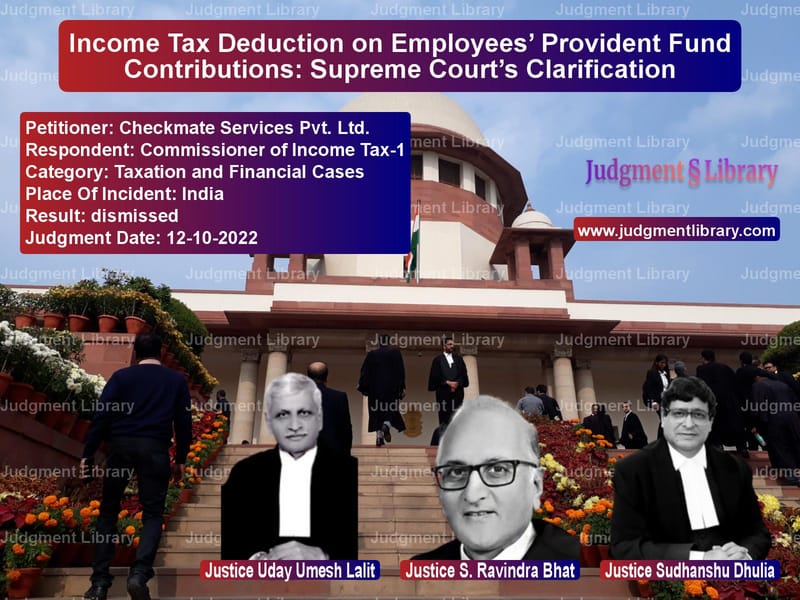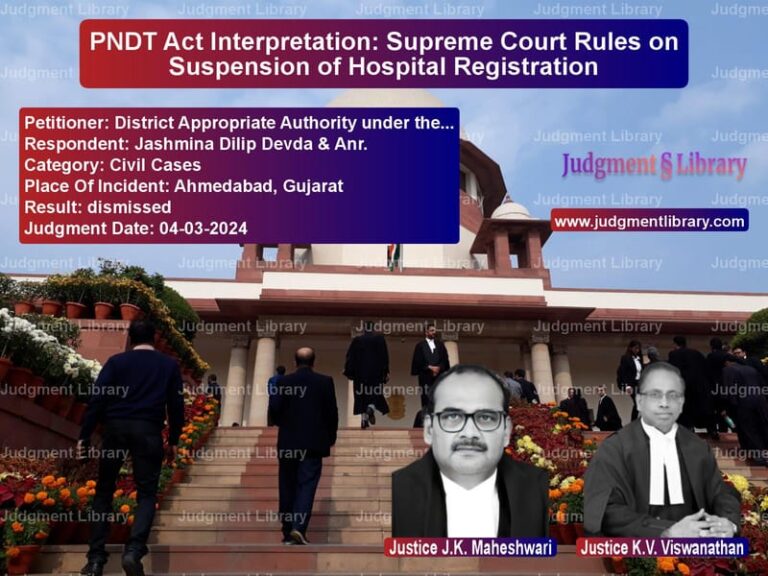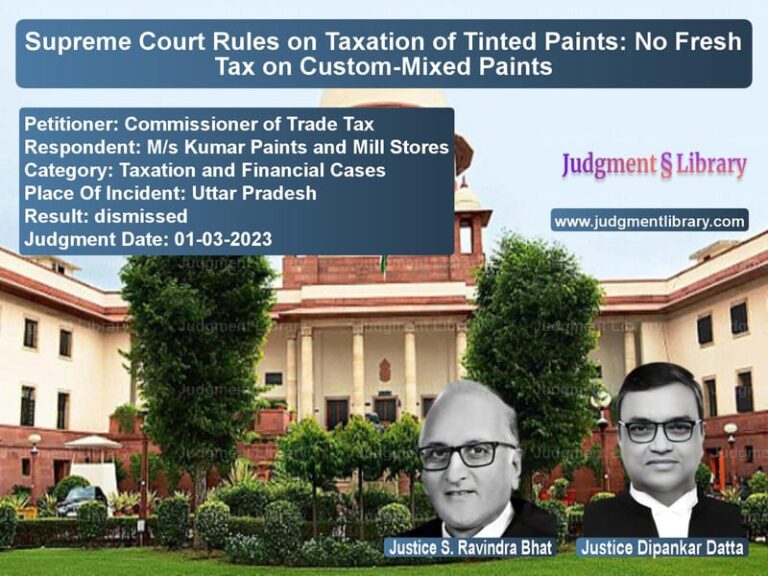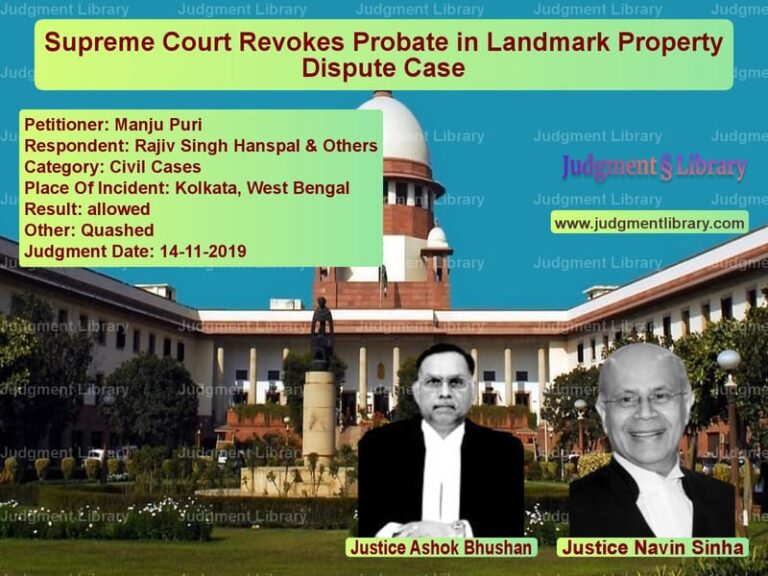Income Tax Deduction on Employees’ Provident Fund Contributions: Supreme Court’s Clarification
The Supreme Court of India, in the case of Checkmate Services Pvt. Ltd. v. Commissioner of Income Tax-1, addressed an important issue regarding the deduction of delayed employees’ provident fund (EPF) and employees’ state insurance (ESI) contributions. The key question before the court was whether such delayed payments could be allowed as deductions under the Income Tax Act, 1961 (IT Act), particularly in light of Sections 36(1)(va) and 43B.
The case revolved around whether contributions made by an employer towards provident fund and ESI beyond the due date specified under the respective labor laws but before filing the income tax return should be eligible for deduction. The appellants argued that such deductions should be permitted, whereas the tax authorities contended that the law clearly differentiates between employer and employee contributions, and the latter must be deposited within the prescribed due date.
Background of the Case
The appeals before the Supreme Court arose from judgments of various High Courts, including the Gujarat High Court, which held that contributions by employers toward EPF and ESI, if made beyond the due date prescribed under the respective laws, could not be claimed as deductions. The Gujarat and Kerala High Courts favored the tax authorities’ stance, while the High Courts of Bombay, Delhi, and Karnataka had ruled in favor of the assessees, allowing deductions if the payments were made before the due date for filing income tax returns.
Statutory Provisions Involved
The relevant provisions of the IT Act analyzed by the court include:
- Section 2(24)(x): Defines “income” to include any sum received by the employer from employees as contributions to provident fund, superannuation fund, or ESI.
- Section 36(1)(va): Allows deduction for employee contributions to provident fund and ESI only if they are deposited on or before the “due date” as per the respective laws.
- Explanation to Section 36(1)(va): Specifies that “due date” means the date prescribed under labor laws, not the due date for filing income tax returns.
- Section 43B: Allows deductions for statutory payments, including employer contributions to provident fund and ESI, if paid before the due date of filing the income tax return.
Petitioner’s Arguments
The appellant, Checkmate Services Pvt. Ltd., contended:
- Section 43B overrides Section 36(1)(va) and should allow deductions if payments are made before the income tax return filing deadline.
- The employer’s and employee’s contributions to EPF and ESI should be treated similarly for deduction purposes.
- Delays in depositing employee contributions were often due to genuine business challenges and should not be penalized under tax laws.
- The Supreme Court’s decision in Commissioner of Income Tax v. Alom Extrusions Ltd. (2010) should apply, where it was held that contributions to welfare funds were deductible if paid before filing the tax return.
Respondent’s Arguments
The tax authorities argued:
- There is a clear statutory distinction between employer and employee contributions under the IT Act.
- Employee contributions belong to employees and must be deposited within the prescribed due date, as per labor laws.
- Section 36(1)(va) specifically mandates timely deposit, and Section 43B does not override this requirement.
- Allowing late deposits as deductions would defeat the purpose of ensuring timely crediting of employee contributions.
Supreme Court’s Observations
The Supreme Court examined the legislative intent behind Sections 36(1)(va) and 43B and noted the following:
- There is a fundamental distinction between employer and employee contributions. Employer contributions are governed by Section 36(1)(iv) and Section 43B, while employee contributions fall under Section 36(1)(va).
- Parliament deliberately introduced Section 36(1)(va) to ensure that employers do not delay depositing funds deducted from employees’ wages.
- Amounts deducted from employees’ salaries but not deposited within the due date prescribed under the EPF and ESI Acts are treated as income of the employer.
- The Explanation to Section 36(1)(va) explicitly clarifies that the “due date” is the date prescribed under labor laws, not the income tax return filing deadline.
Final Verdict
The Supreme Court ruled in favor of the tax authorities, holding that:
- Late deposits of employee contributions to provident fund and ESI beyond the prescribed due date under labor laws are not eligible for deduction under the IT Act.
- Section 43B does not override the strict requirements of Section 36(1)(va).
- Employers must ensure that employee contributions are deposited within the statutory deadlines to qualify for tax deductions.
As a result, the appeals were dismissed, and the court upheld the Gujarat High Court’s interpretation that only timely deposits of employee contributions qualify for deduction.
Implications of the Judgment
The ruling clarifies the tax treatment of delayed EPF and ESI contributions and has significant implications for employers:
- Employers must strictly adhere to the due dates prescribed under labor laws to claim deductions.
- Delays in depositing employee contributions will lead to permanent disallowance of deductions.
- Businesses should ensure proper financial planning to avoid unnecessary tax liabilities due to late deposits.
This judgment reinforces the importance of timely compliance with statutory obligations and discourages misuse of employee funds by delaying deposits.
Petitioner Name: Checkmate Services Pvt. Ltd..Respondent Name: Commissioner of Income Tax-1.Judgment By: Justice Uday Umesh Lalit, Justice S. Ravindra Bhat, Justice Sudhanshu Dhulia.Place Of Incident: India.Judgment Date: 12-10-2022.
Don’t miss out on the full details! Download the complete judgment in PDF format below and gain valuable insights instantly!
Download Judgment: checkmate-services-p-vs-commissioner-of-inco-supreme-court-of-india-judgment-dated-12-10-2022.pdf
Directly Download Judgment: Directly download this Judgment
See all petitions in Income Tax Disputes
See all petitions in Tax Evasion Cases
See all petitions in Banking Regulations
See all petitions in Judgment by Uday Umesh Lalit
See all petitions in Judgment by S Ravindra Bhat
See all petitions in Judgment by Sudhanshu Dhulia
See all petitions in dismissed
See all petitions in supreme court of India judgments October 2022
See all petitions in 2022 judgments
See all posts in Taxation and Financial Cases Category
See all allowed petitions in Taxation and Financial Cases Category
See all Dismissed petitions in Taxation and Financial Cases Category
See all partially allowed petitions in Taxation and Financial Cases Category







